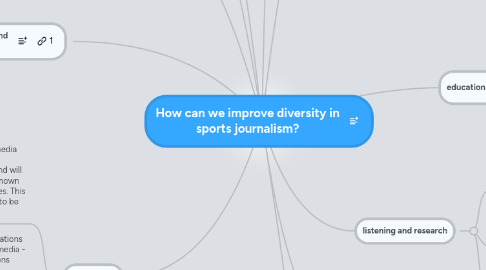How can we improve diversity in sports journalism?
por Jan Kampmann

1. diversity work in newsrooms
1.1. appoint "diversity officers" (instead of "equality officers")
1.2. employers should allow time for diversity work
1.3. organisations have to acknowledge and cope with their past before working on their present and future
1.4. media organisations should make explicit statements of diversity
1.5. Good examples: that community and independent media are doing much to attempt combat racism.
1.6. Regular awareness raising activities are needed; not just project-based
1.7. go into the newsroom and find some ways to engage the editors/journalists in observation of the news production process
1.7.1. To keep insisting more to have great stories to tell; there are lots of interesting stories in sport; we can enlarge our point of view and diversity of stories that we are telling.
1.8. more diversity within the personnel and in the offices where the decisions are made
1.9. Codes of ethics shouldn’t be the main goal - journallists need to propose and write more articles about diversity issues to serve as an example
2. duties of organisations and initiatives
2.1. more complaints
2.2. ask to regularly publish results and coverage of female / Paralympic sports and if the media already do so send compliments to keep it alive
2.3. good and authentic public relations work of the club - so that they influence the way their athletes (also female and disabled) come across positively
2.4. find attractive angles to topics and direct them to the media
3. networking
3.1. Need to widen contacts lists, both a media organisation's and those of individual journalists. Often journalists are lazy and will simply keep going back to the same, known contacts who provide them with quotes. This fits in with empowering organisations to be proactive and to approach the media.
3.1.1. as a consequence of this: choose more women, disabled people, black people as sources of information; this could be used as a soft power
3.2. cooperation between different organisations - education, NGOs, sport institutions, media - to jointly identify problems and solutions
3.2.1. engage with associations, movements, NGOs, as sources of information and knowledge
3.3. Discussions to be organized with experts in journalism for a wider audience, we do not always need institutions fpr thjs
3.4. take advantage of international contacts and sharing projects/good practices is important in improvement of diversity reporting
3.5. Invite popular faces in sport at roundtables and workshops to show colleagues how interesting the sport could be
4. confrontation therapy?
4.1. Hans Laroes (UER/EBU) encouraged media organisations to look at who they are afraid of. He told of an exercise where he asked that question to journalists - and then told them to phone the people for quotes.
4.2. Journalists are afraid of making a mistake and looking silly, and therefore are reluctant to approach diversity stories. Meeting minority groups can help overcome fears.
5. sanctions
5.1. Criticised as too soft by John Amaechi (he highlighted Chris Moyles not being disciplined for using the word gay as an insult on the air)
5.2. make sure work experience is paid for better motivation to do PROPER work and believe in the chance of changing the industry
6. budget and grants
6.1. need to to increase grants for public/private media
6.2. Internships for people with different backgrounds to come to work in the media organization; grants for journalists for cross-border reporting
7. media training
7.1. especially organisations underrepresented in the media
7.2. cooperation with universities to train youngsters in diversity
7.3. funding for journalists to spend time in classrooms with pupils as media educators
7.4. Encourage journalists to train themselves on diversity reporting; to become skillful in initiation of a dialogue; to find common language and understanding; raising awareness of very sensitive issues;
8. education
8.1. Craig Bankhead (Show Racism the Red Card) gave the example of a Newcastle fan who shouted racist abuse, but was given the opportunity to examine why he had done this
8.2. ask governments and organisations NOT to reduce budgets and remove obstacles for young students to become journalists
8.3. go to the areas/communities trying to get people to see that there is a whole industry in the media
9. Paralympic athletes
9.1. Spreading styleguides to writing about people with disabilties (see links)
10. duties of sport federations
10.1. help and support young people from diverse backgrounds to become journalists
11. listening and research
11.1. listen to the audience
11.2. closer connectivity with social media - social media surgerys, training for journalists, so that relationship to readers/viewers/users is better and more transparent
11.3. good examples from national and international media companies are a good way to promote new initiatives


